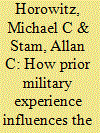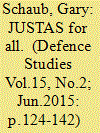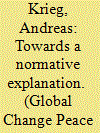| Srl | Item |
| 1 |
ID:
129490


|
|
|
|
|
| Publication |
2014.
|
| Summary/Abstract |
Militaries commonly require recruits to pass a test that measures aptitude for military service. In this paper, we show that such tests may also act as a device for screening out low-motivation recruits, even if it is assumed that motivation is not measured by such tests and is not correlated with aptitude.
|
|
|
|
|
|
|
|
|
|
|
|
|
|
|
|
| 2 |
ID:
130140


|
|
|
|
|
| Publication |
2013.
|
| Summary/Abstract |
OEMs (Original Equipment Manufacturers) increasingly outsource (part of) their supply chains to contract manufacturers. Various benefits, reasons, risks, and theories on outsourcing have been developed, discussed, and analysed in a wide body of literature. This article focuses on supporting national Armed Forces on and off the battlefield.
|
|
|
|
|
|
|
|
|
|
|
|
|
|
|
|
| 3 |
ID:
133273


|
|
|
|
|
| Publication |
2014.
|
| Summary/Abstract |
Policy-makers and the electorate assume political executives' life experiences affect their policy choices once in office. Recent international relations work on leaders focuses almost entirely on how political institutions shape leaders' choices rather than on leaders' personal attributes and how they influence policy choices. This article focuses the analytic lens on leaders and their personal backgrounds. We theorize that the prior military background of a leader is an important life experience with direct relevance for how leaders evaluate the utility of using military force. We test several propositions employing a new data set, building on Archigos, that encompasses the life background characteristics of more than 2,500 heads of state from 1875 to 2004. The results show that the leaders most likely to initiate militarized disputes and wars are those with prior military service but no combat experience, as well as former rebels.
|
|
|
|
|
|
|
|
|
|
|
|
|
|
|
|
| 4 |
ID:
139207


|
|
|
|
|
| Summary/Abstract |
Canada owns and uses unmanned aerial vehicles (UAVs), but its military services have acquired and integrated them into their force structure and operations with different degrees of ease. Service differences are explained with a three variable innovation adoption framework that integrates cost, impetus, and disruptive nature. The Army and Navy framed UAVs as relatively inexpensive adaptive innovation that would help avoid operational failures. The Air Force framed UAVs as expensive disruptive innovation that could improve performance of core functions but experienced UAVs as inexpensive adaptive innovations that helped avoid operational failure; yet these successes were perceived as inadequate. Analyzing services captures processes that national studies miss.
|
|
|
|
|
|
|
|
|
|
|
|
|
|
|
|
| 5 |
ID:
125073


|
|
|
|
|
| Publication |
2013.
|
| Summary/Abstract |
The heavy direct or indirect reliance of liberal states on the military and security services of the private contractor in contemporary warfare is an undeniable reality. While the literature presents a wide array of different empirical explanations of why liberal states have come to increasingly rely on contractor support, this paper attempts to give a normative explanation to this development. This paper does not aim to refute the existing explanations but merely complement the most commonly stated reasons for outsourcing. It argues that the liberal state's hiring of private contractors can be understood against the backdrop of a wider trend whereby liberal states, increasingly operating in non-trinitarian operations, attempt to replace the soldier as a trinitarian servant with non-trinitarian means of warfare. This correlation between liberal state commitments in non-trinitarian warfare and a growing employment of non-trinitarian means of warfare can be explained by Social Contract theory and lays the foundation for a normative understanding of why liberal states resort to non-trinitarian contractor support amid non-trinitarian crises.
|
|
|
|
|
|
|
|
|
|
|
|
|
|
|
|